We’re Voting YES for a Stronger Princeton!
Election Information:
- When: Wednesday, 5/8 and Thursday, 5/9, between 9am-1pm and 2pm-6pm both days
- Where: Frist Campus Center Room 302 [google map]
- Who: Eligible voters are Postdoctoral Research Associates, Postdoctoral Research Fellows, Associate Research Scholars, Senior Research Assistants, and Postgraduate Research Associates on payroll as of March 19th.
- How: Bring your Princeton ID, or another form of government-issued identification.
Voting Location: Frist Campus Center
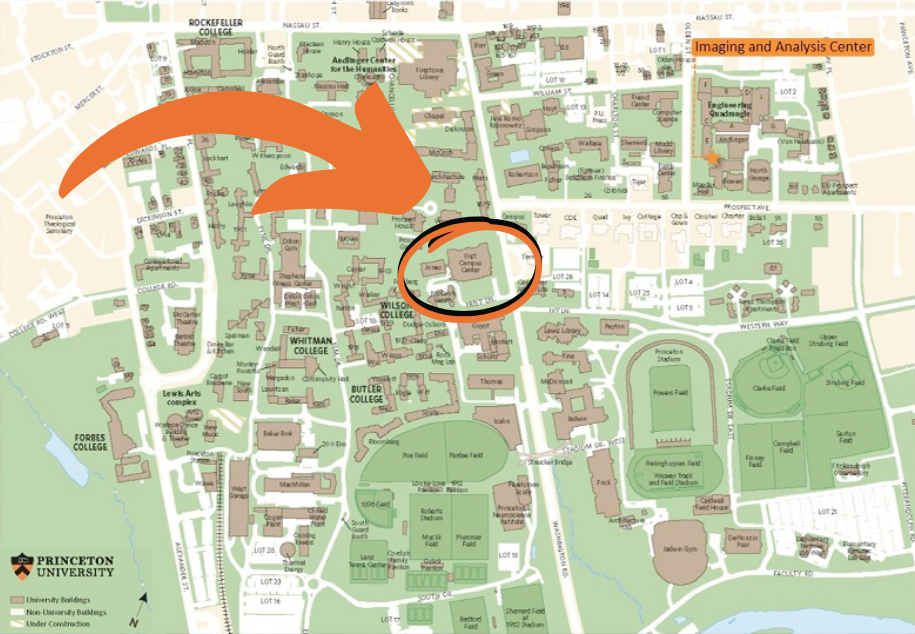
We have a clear choice in this election.
Voting “YES” means Princeton administrators would have a legal obligation to bargain with our elected postdoc representatives over pay, benefits and workplace rights, and to secure any agreements on improvements or maintaining current benefits in a legally binding and enforceable contract. We will be joining nearly 120,000 UAW academic employees across the country in working together to make higher education workplaces more just, fair, and equitable.
Over the course of hundreds of conversations, we’ve seen that postdoctoral researchers at Princeton share many of the same challenges. These include bureaucratic hurdles and insecurity for international workers, unpredictable salary increases that don’t match the high cost of living in Princeton, insufficient support for parents, and the lack of enforceable procedures address sexual harassment, discrimination, and bullying. These challenges add unnecessary stress to the postdoc experience and make it more difficult to focus on doing quality research.
Right now, Princeton administrators decide unilaterally if, how, and when to address problems affecting postdocs. With collective bargaining, we will gain the right to meet at the bargaining table as equals. With strong participation and support in our vote we can negotiate a contract that not only improves our pay, benefits, and workplace rights, but also ensures the security and stability that enables us to do quality research.
In hundreds of conversations, postdoctoral researchers have identified common priorities for our first contract. We are ready to hit the ground running and negotiate the contract that we deserve. Vote for a Stronger Princeton — vote “union yes” on May 8-9th.
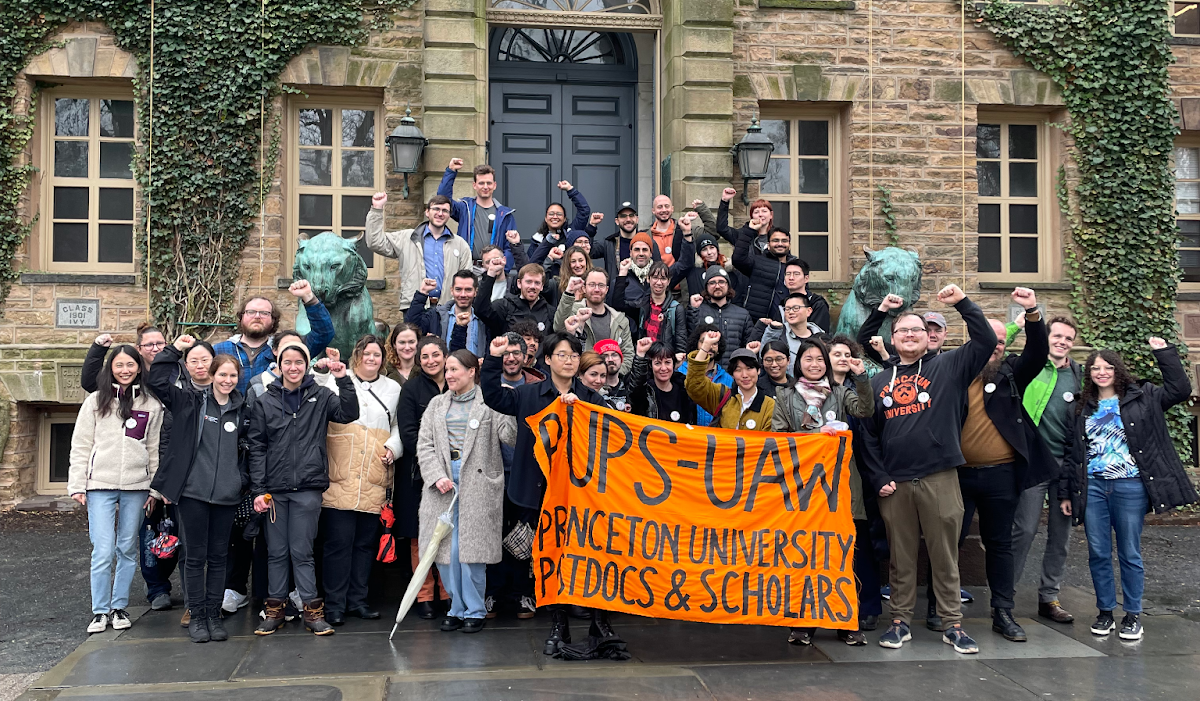
Princeton postdocs and scholars delivered an open letter to the administration to announce filing our petition with the NLRB for a union election and ask Princeton to remain neutral and not to interfere with researchers’ right to make our own decision on unionization.
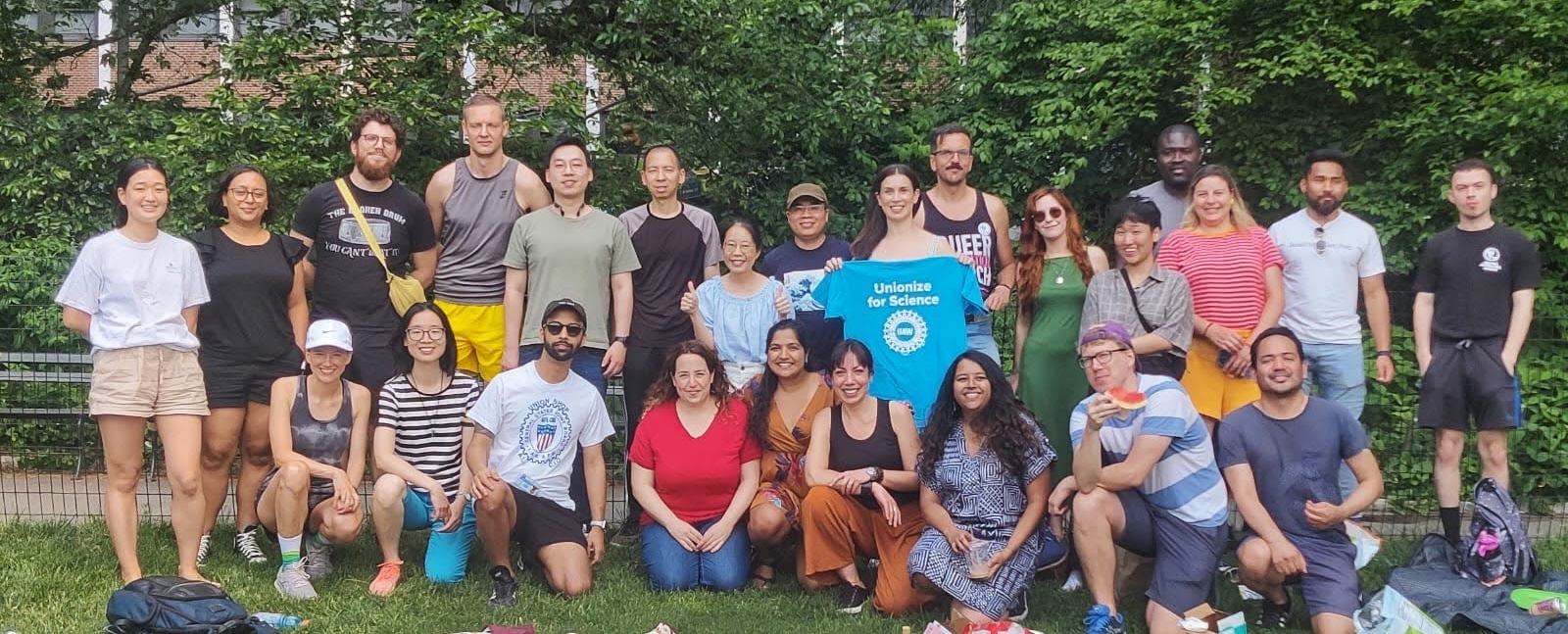
Princeton postdocs met up with unionized colleagues in the UAW from Columbia, Mount Sinai, New York University, and other institutions at a picnic to kick-off the summer.
Fair workplace standards enable postdocs to prioritize research.
As postdocs, we drive the research mission of the University, contributing to the discoveries that have established Princeton’s world-class reputation and draws roughly $300 million in grant funding every year. We do it in the face of historically high inflation, with a minimum salary that is falling behind other major research institutions across the U.S.
In 2020, postdocs at Columbia approved their first union contract and took their minimum salaries from the lowest for postdocs in New York City to the highest. In doing so, they helped raise the standard for other peer institutions. In their subsequent 2023 contract, they continued to build on these gains with postdocs set to receive up to 24% raises over the life of the contract. It is time for us to come together and demand salaries and other benefits that reflect the value of our contributions, and to secure them in a contract, so we can focus on the quality of our research instead of how to make ends meet.
How have other postdocs used a union contract to improve compensation?
University of California postdocs have negotiated the highest pay of any public university postdocs
Princeton postdocs and scholars used collective action to win a 18.5% increase to salaries in 2023
“The first ever postdoc union at a private US university has been formed”
Sinai postdocs won the highest minimum salaries for postdocs in the country

“When I was a new parent working at at Columbia, my work and life experience dramatically improved after we unionized. I’m voting YES because I would love to repeat that experience at Princeton.”
“Collective action works. We won an 18% increase to postdoc minimum salaries through our organizing, and by joining with more than 100,000 postdocs and grad students in the UAW we can do even more.”
“Postdocs are an enormous force of innovation and research, particularly at Princeton–every single one of us should have the income, benefits, and support from the University needed to lead balanced lives. No-one should have to worry if they’ll still have a job at the end of a short contract, or if they’ll be able to afford another rent increase. Unionization and collective action can give us the power to improve our lives.”
Collective bargaining can create a more accessible postdoc experience.
As postdocs, we are placed on one of the lowest priority levels for the University housing that our faculty and graduate student colleagues currently enjoy. This lack of institutional support, combined with the high cost of living and housing in Princeton leaves many postdocs, particularly international scholars moving from abroad to start their positions, struggling to find affordable housing and burdened with moving expenses. Many of us, especially those with children, are forced to live increasingly far away and spend more time on our commutes, taking time away from our research. Through collective bargaining, we know that we can demand better support from the University and make living and working in Princeton more accessible.
How have postdocs at other institutions used a contract to improve the postdoc experience?
Read about the growth of postdoc unions in Inside Higher Ed
Read about all the improvements UC postdocs have negotiated to improve and stabilize their work
“The lack of affordable housing near Princeton causes uncertainty and stress – we are constantly moving farther away from campus to offset rising costs. With a union we can bargain for salaries that keep pace with the high cost of living and inflation in Princeton.”
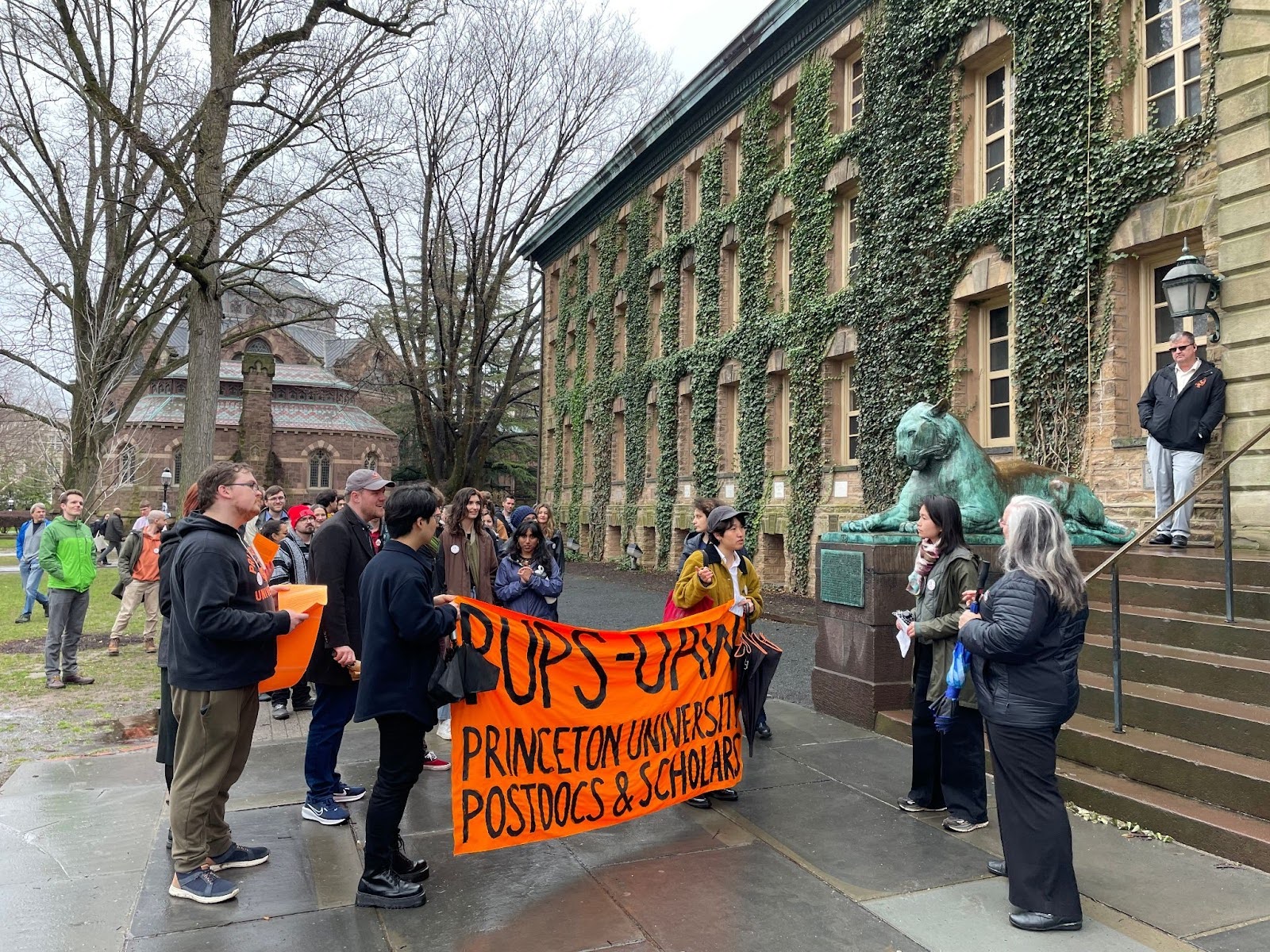
A stronger voice to advocate for International Worker rights.
With nearly 120,000 academic workers across the US, including postdocs, student workers, and non-tenure-track faculty, the UAW has become a leading voice advocating for expanded rights and opportunities for international academic workers, including students transitioning to early-career research positions like postdocs, in the US as well as for robust federal investment in science research. UAW academic workers’ advocacy work also played a key role in ensuring the inclusion of postdocs in the 2016 federal overtime rules and, most recently, increased NIH pay levels for pre- and postdoctoral researchers announced in April 2024.
International researchers have played a significant role in the leadership of UAW, which has in turn helped make international worker issues central to the UAW’s mission, particularly in higher education. Postdoc and graduate employee unions affiliated with UAW are often led by international students and scholars, who serve in top leadership positions in local unions nationwide.
Joining together with other academic workers in the UAW has become more urgent than ever as recent government actors have waged unprecedented attacks on science, sexual harassment protections, and the rights of international scholars.
Letter to the editor: UAW is a strong ally for international students and postdocs
As International Researchers at Columbia University we are voting Yes for our Union
Read about UC postdoc and UAW efforts to support federal science funding
UAW 5810 Resolution To Mt. Sinai Postdocs on International Researcher Rights
“My postdoc is difficult enough without the added stress that comes with managing my immigration status. A union would provide a voice for international workers at Princeton, and our national union could help influence immigration policy.”
“International researchers face many unique challenges, which can accumulate and negatively affect our morale as workers. I’m voting YES so that incoming postdocs can have an easier transition to the US and invest more of our valuable time in our research.”
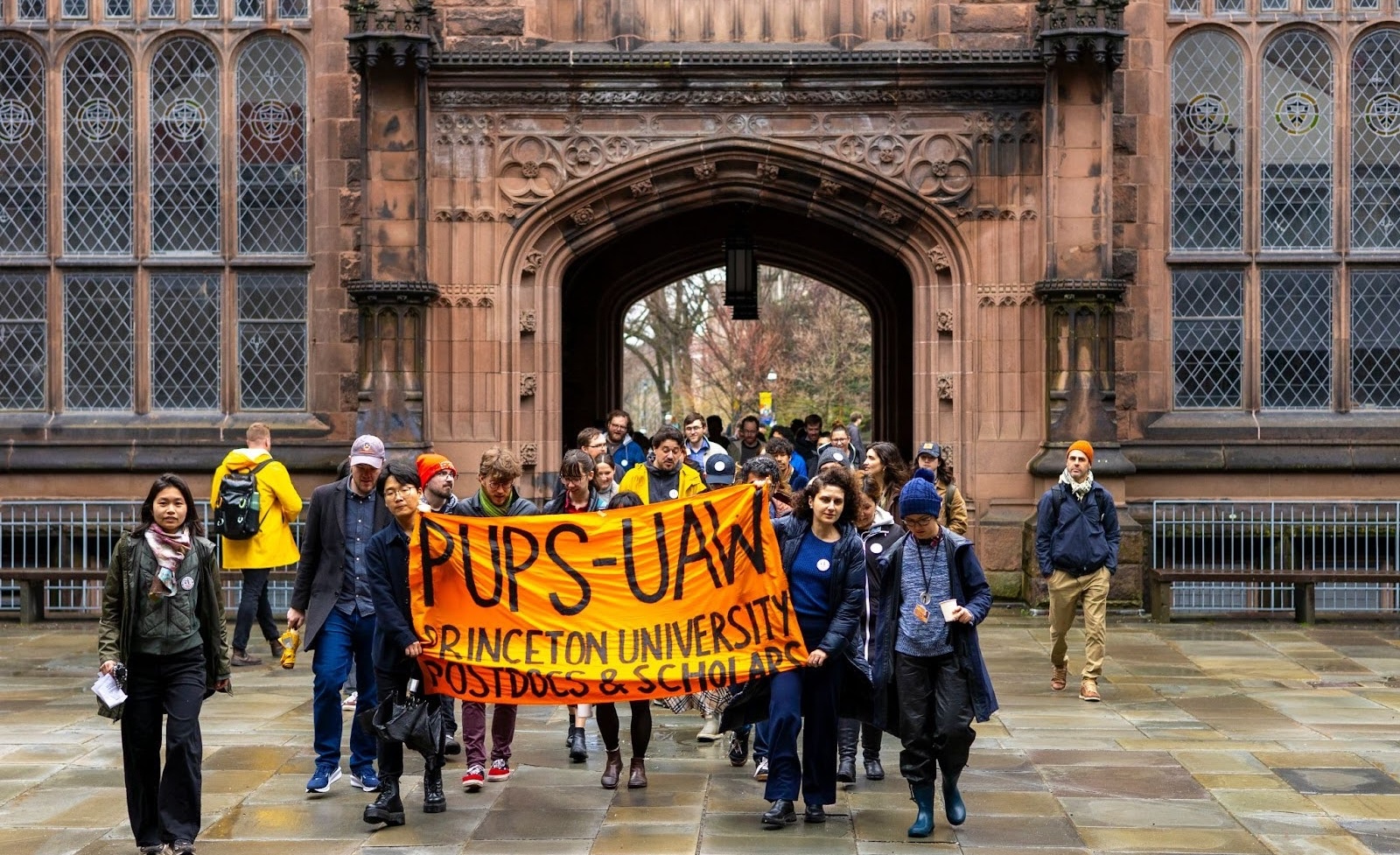
Our research is stronger when everyone can contribute.
Pregnancy, childbirth and adoption should be occasions for celebration – without unnecessary stress caused by having to return to work too soon after giving birth, or concerns about unstable benefits, housing, or visa status. Unfortunately, this kind of stress is all too prevalent for postdoc parents. Women postdocs with families in particular face discrimination and unequal pressures, making them far more likely than men to leave academia before obtaining tenure at a college or university.
Under-representation of women in senior roles has been a longstanding problem within academia, and that’s why winning significant improvements in this area is so important.
Read how other postdocs have unionized and made their employers more family friendly.
Why Sinai postdoc parents voted “YES” for a more family-friendly research community
Columbia graduate workers win fully-paid dependent health insurance
Columbia Postdocs Win Emergency Child Care Subsidy During Pandemic
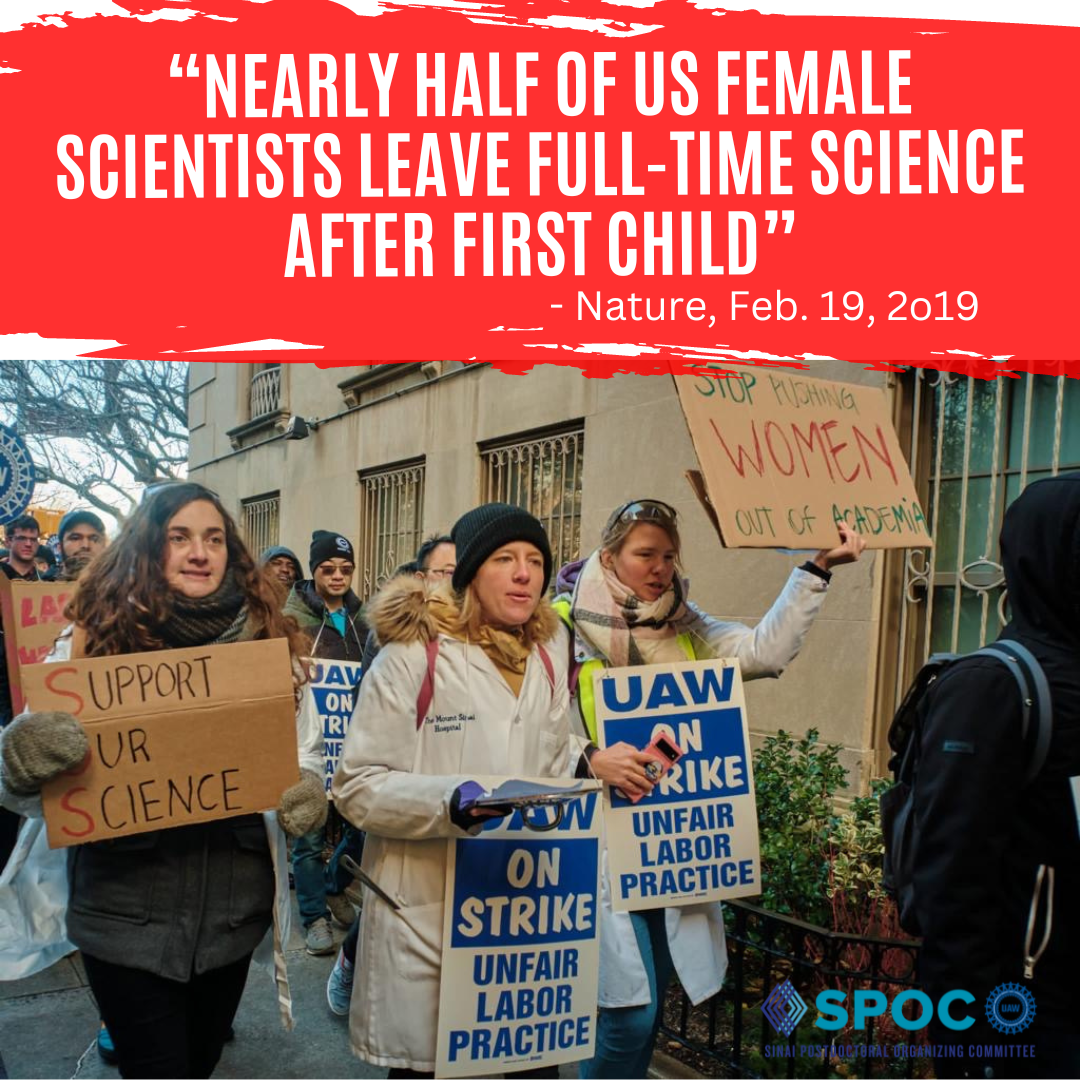
“Like many working parents, I cannot afford to raise a family in Princeton. I’m voting YES to give us a stronger platform to negotiate for family-friendly policies so all postdocs have the support we need to care for our families while navigating precarious academic work.”
Together we can make Princeton more equitable and inclusive.
Inequalities based on gender, race, sexual orientation and immigration status continue to create barriers for many of the most talented to enter the academic and scientific workforce. Existing systems of recourse for problems like discrimination, harassment, and bullying too often fail and can take years. Though much work remains to be done, postdocs, graduate students and adjunct faculty in the UAW have helped make progress on many of these issues, both at the bargaining table and in policy advocacy through the UAW. At the University of Connecticut, for example, a graduate assistant worked with her union to successfully resolve a major sexual assault and harassment complaint in three months.
UConn Graduate Student Union Helps Handle Sexual Harassment
“Workplace Bullying in Higher Education is Rampant. We’re Fighting Back”
UC International Postdoc Takes on Pregnancy Discrimination and Wins
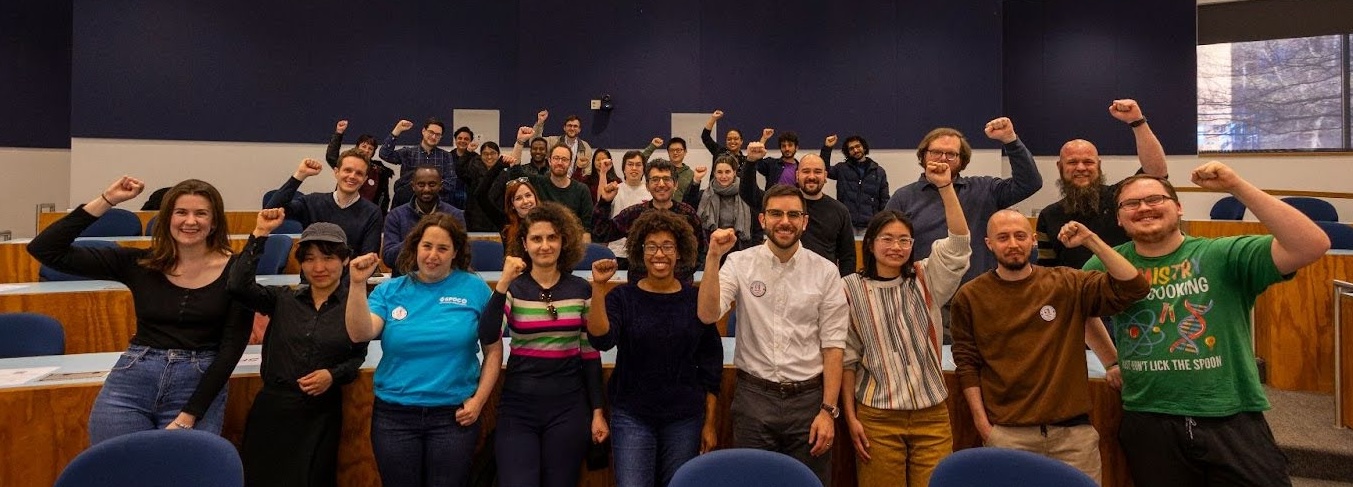
“Being unionized as a graduate student made me more confident that discrimination and harassment claims would be taken seriously by the university and allowed us to bargain collectively to secure better benefits.”
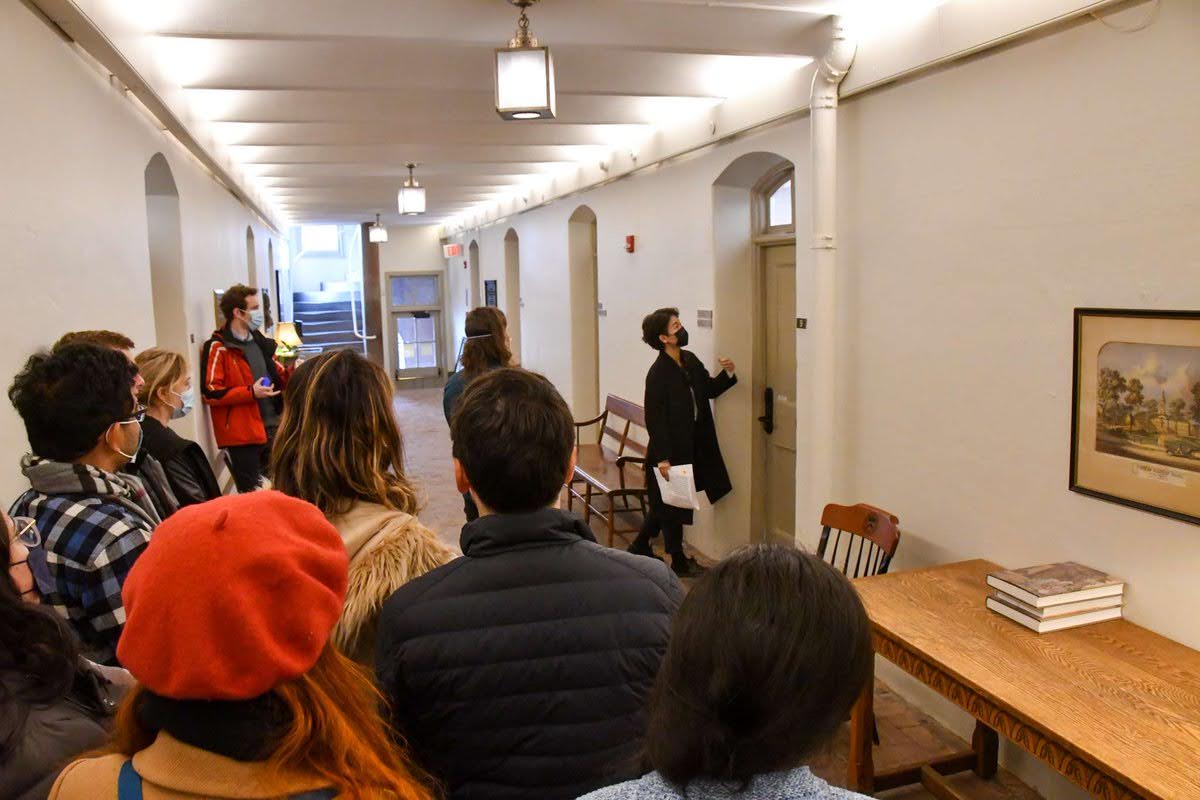
In January 2023, postdocs delivered a petition demanding an increase to the minimum postdoc salary that resulted in significant raises for many workers.
We are voting YES for our union, Princeton Postdocs and Scholars-UAW (PUPS-UAW)!
To our fellow postdocs and research scholars,
We are postdoctoral workers across departments at Princeton. We are scholars, mentors, and teachers who are essential to the world-class research conducted at Princeton. On May 8th and 9th, we’ll have the opportunity to vote yes for our union: Princeton University Postdocs & Scholars – UAW (PUPS-UAW).
Without collective bargaining, postdocs and scholars at Princeton have faced astronomically high costs of living, lack of housing availability, insufficient support for parents and international scholars, and many other challenges. Two-thirds of postdocs and scholars at Princeton have already signed authorization cards because we want to be able to bargain collectively to address these issues. A strong yes vote on May 8th and 9th is our chance to send a strong message to the university that postdocs are united in our desire to improve the postdoc experience at Princeton and create a more equitable, inclusive, and fair research environment.
Last spring, we saw the power of postdocs coming together when we won pay increases through our petition. A union will allow us to build on those efforts. With a majority vote for PUPS-UAW, we’ll finally have a seat at the table: Princeton will be legally obligated to negotiate with postdocs as equals.
By voting yes we will also join thousands of other postdoctoral workers at peer institutions across the country who have unionized and won major improvements to pay and other working conditions.
We, the undersigned, have committed our votes and hope you’ll join us in voting “yes” to form our union: May 8th and 9th, 9am–1pm, 2pm-6pm at Frist Campus Center room 302.
Aakash Sane, Program in Atmospheric and Oceanic Sciences
Aaron Griffing, Molecular Biology / Chemical & Biological Engineering
Abdelrahman Hamdan, Andlinger Center for Energy and the Environment
Adbhut Gupta, Electrical and Computer Engineering
Adel Ardalan, Princeton Neuroscience Institute
Aditya Dilip Lele, Mechanical & Aerospace Engineering
Aimane Najmeddine, Civil and Environmental Engineering
Alex Johnson, Lewis Sigler Institute
Alexander Haseloer, Chemistry
Alexander Quanbeck, University Center for Human Values
Alina Emelianova, Chemical and Biological Engineering
Allen Foster, Physics
Anamika Anamika, Mechanical and Aerospace Engineering
Andrea Mariossi, Lewis-Sigler Institute for Integrative Genomics
Ani Prabhu, Physics
Ankan Sur, Department of Astrophysical Sciences
Annie Stephenson, High Meadows Environmental Institute and Ecology and Evolutionary Biology
Anubhav Jha, Politics
Arman Pouyaei, Atmospheric and Oceanic Sciences
Ashley Chontos, Department of Astrophysical Sciences
Ashley Fidler, Chemistry
Attila Bodi, Department of Astrophysical Sciences
Augustin Hennings, Princeton Neuroscience Institute
Benjamin Remy, Department of Astrophysical Sciences
Bhuwan Khatri Chhetri, Molecular Biology
Bonan Zhao, Computer Science
Camilo Hernández, Operations Research and Financial Engineering
ChangHoon Hahn, Department of Astrophysical Sciences
Charlotte Ward, Department of Astrophysical Sciences
Chetan Aditya, Molecular Biology
Christian Rivera, High Meadows Environmental Institute
Chuan Zhong, Electrical and Computer Engineering
Cong Ma, Computer Science
Dan Bolger, School of Public and International Affairs
Daniel Feldmeyer, Center for Policy Research on Energy and the Environment
Daniel Hirschel-Burns, Program in Latin American Studies
Daren Wu, Andlinger Center for Energy and the Environment
David Hosking, Physics
Delilah Gates, Physics
Devin Simpkins, Molecular Biology
Diogo Melo, Ecology and Evolutionary Biology & Lewis-Sigler Institute for Integrative Genomic
Dominik Charczun, Chemistry
Elizaveta Elshina, Molecular Biology
Esmeralda Fonseca, Princeton Neuroscience Institute & Department of Molecular Biology
Evan Russek, Psychology, Computer Science
Eve Beaury, Ecology and Evolutionary Biology
Forrest Rogers, Princeton Neuroscience Institute & Department of Molecular Biology
Francisco Apen, Geoscience
Fraser Binns, Mathematics
Gage DeZoort, Physics and Operations Research and Financial Engineering
Gautam Satishchandran, Physics
Grace C. McKenzie-Smith, Physics & Lewis Sigler Institute
Grace Kuipers, High Meadows Environmental Institute
Grace Panetti, Chemistry
Guenther Turk, Mechanical and Aerospace Engineering, Princeton Materials Institute
Guillaume Falmagne, High Meadows Environmental Institute and Ecology and Evolutionary Biology
Halley Washburn, Molecular Biology
Happy Buzaaba, PIIRS
Harrison Ritz, Princeton Neuroscience Institute
Hernando Colman, Mechanical and Aerospace Engineering
Iakovos Saridakis, Chemistry
Jaehoon Ji, Electrical and Computer Engineering
Javier Masis, Princeton Neuroscience Institute
Jeff Gay, Geoscience
Jessica Ng, High Meadows Environmental Institute
Jie Liu, Molecular Biology
John Ganley, Chemistry
Jonathan Fetherolf, Chemistry
Juan Ferre, Program in Latin American Studies
Judy Kim, University Center for Human Values
Julie Charlton, Princeton Neuroscience Institute
Kamesh Krishnamurthy, Physics
Kanato Gao, Physics
Kate Nussenbaum, Princeton Neuroscience Institute
Katerina Kanevche, Chemistry
Katie Copenhagen, Lewis-Sigler Institute for Integrative Genomics & Physics
Kirsten Ziman, Princeton Neuroscience Institute
Kun Gao, Atmospheric and Oceanic Sciences
Kwan Yin Lee, Molecular Biology
Kyuwon Lee, Politics
Lacy Feigh, Society of Fellows
Laila Omar, PIIRS
Laura Ioca, Molecular Biology
Lin Lin, Andlinger Center for Energy and the Environment
Luca Orusa, Department of Astrophysical Sciences
Lucia Stein-Montalvo, Civil and Environmental Engineering
Mae Guthman, Princeton Neuroscience Institute
Manuel Schottdorf, Princeton Neuroscience Institute
Maral Sahebjame, Center for Iran and Persian Gulf Studies
Martin Zettersten, Psychology
Mebrahtu Weldeghebriel, Geoscience
Megan Rothstein, Molecular Biology
Merihan Alhafnawi, Mechanical and Aerospace Engineering
Michael Montesano, Princeton Institute for International and Regional Studies PIIRS
Michelle Livings, Center for Research on Child and Family Wellbeing
Mika Diamanti, Princeton Neuroscience Institute
Milos Nikolic, Lewis-Sigler Institute for Integrative Genomics
Moamen Elmassry, Molecular Biology
Mohan Gupta, Psychology
Mostafa Abdou, Princeton Neuroscience Institute
Mufan Li, Operations Research and Financial Engineering
Nate Otjen, High Meadows Environmental Institute
Nathan Jessee, High Meadows Environmental Institute
Naveed Mansoori, Bijan and Sharmin Mossavar-Rahmani Center for Iran and Persian Gulf Studies
Nima Jaberi-Lashkari, Chemical and Biological Engineering
Noriyuki Takanashi, Chemistry
Nusrat Molla, Andlinger Center for Energy and Environment
Oded Bein, Princeton Neuroscience Institute / Psychology
Palash Sashittal, Computer Science
Paola Estrada, Molecular Biology
Peter Morse, Chemistry
Pok Man Tam, Physics
Polina Lamshchinina, Princeton Neuroscience Institute
Rachel L Bedder, Princeton Neuroscience Institute & Department of Psychology
Rajsekhar Mohapatra, Astrophysical Sciences
Rajsekhar Mohapatra, Department of Astrophysical Sciences
Razia Sahi, Psychology
Rebecca Jones, Molecular Biology
Rich Pang, Princeton Neuroscience Institute & Biophysics (CPBF)
Robert Martin, Chemistry
Ruojun Wang, Molecular Biology
Ryan McNamee, Chemistry
Sadaf Ul Zuhra, Electrical and Computer Engineering
Sally Xie, Psychology
Salma Mozaffari, Civil and Environmental Engineering
Samuel A. Nastase, Princeton Neuroscience Institute
Samuel Eastman, Chemical and Biological Engineering
Sara Al-Sayed, Program on Science and Global Security – SPIA
Sergio Garcia Echauri, Chemical and Biological Engineering
Seth Akers-Campbell, Princeton Neuroscience Institute
Shengyi Wang, Computer Science
Shipeng Zhang, Atmospheric and Oceanic Sciences
Siddartha Gupta, Department of Astrophysical Sciences
Sina Razzaghi, School of Public and International Affairs
Sina Tafazoli, Princeton Neuroscience Institute & Department of Molecular Biology
Sonali Dhanpal, Architecture
Sunghoon Hwang, Molecular Biology
Susanna Azzoni, Physics
Suvendu Giri, Physics
Talia Borofsky, Ecology and Evolutionary Biology
Tanya Berry, Chemistry
Umut Kamber, Physics
Vicente Valenzuela Villaseca, Department of Astrophysical Sciences
Viliam Vano, Physics
Wessam Mohamed, MolBio
Wouter Haverals, Center for Digital Humanities
Xukang Shen, Molecular Biology
Yeon Soon Shin, Psychology
Yi LIu, Geoscience
Zhuo Li, Andlinger Center for Energy and the Environment
